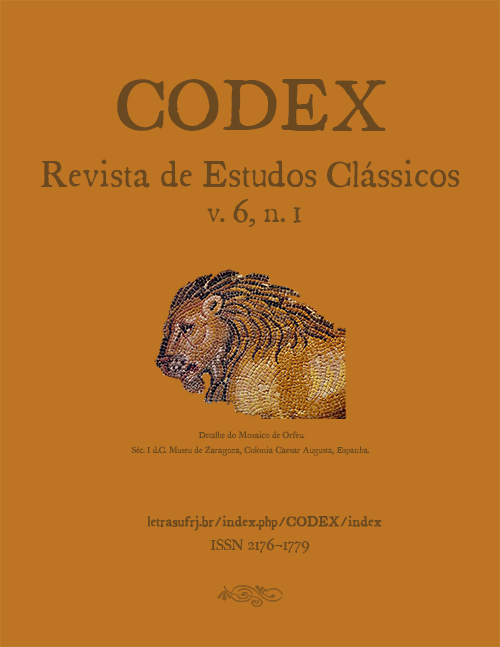As tragédias pessoais de Quintiliano na Institutio oratoria: captatio beneuolentiae, interlúdio ou desabafo público? (Inst. 6, Proêmio)
DOI:
https://doi.org/10.25187/codex.v6i1.15261Keywords:
Quintilian, Institutio Oratoria, personal tragedy, páthos, audience commotionAbstract
This paper aims to present a translation of the Proem to the sixth book of Institutio Oratoria by Quintilian, analyzing the rhetorical strategies used by the author to move the audience through his narrative. In the Proem to this book, which concludes the first half of the work, Quintilian exposes the dramas of his personal life and cries out for the premature death of his wife and two sons, in a tragic and involving narrative, strongly marked by the pathetic tone. Based upon the study of the original Latin text, the Aristotelian influences and the previous studies of the researchers that had already focused on this matter, we will try to put under suspicion the prerogative that the proem would be only a public outburst written by Quintilian about his own tragedies, as the empirical author. In order to do so, we will attempt to point out some textual evidence that allows us to confirm that the Proem of this book also stands as a rhetorical exercise for the application of the lessons prescribed throughout his rhetorical manual, particularly regarding the manipulation of emotions.Downloads
References
REFERÊNCIAS BIBLIOGRÁFICAS
ARISTÓTELES. Retórica. Trad. de Manuel Alexandre Júnior, Paulo Farmhouse Alberto e Abel do Nascimento Pena. Lisboa: Imprensa Nacional, 1998.
ARISTOTLE. Ars Rhetorica. W. D. Ross. Oxford: Clarendon Press, 1959
FALCÓN, Rafael Sento-Sé Guimarães. A Educação do orador: Tradução e estudo do livro II da Institutio oratoria. Dissertação de Mestrado. São Paulo: Letras Clássicas e Vernáculas da Faculdade de Filosofia, Letras e Ciências Humanas/ Universidade de São Paulo, 2015.
FARREL, Joseph. “The Augustan Period: 40 BC--AD 14”. In: HARRISON, Stephen (Ed.). A Companion to Latin Literature. Oxford: Blackwell Publishing, 2005, p. 44-57.
CLARKE, M. L. “Quintilian: a biographical sketch”. Greece and Rome, v. 14, p. 24-37, 1967.
GENETTE, Gerard. Palimpsestos: a literatura de segunda mão. Belo Horizonte: Edições Viva Voz, 2010.
HALL, Jon. “Cicero and Quintilian on the oratorical use of hand gestures”. The Classical Quarterly, v. 54, p. 143-160, 2004.
KATULA, Richard A. “Quintilian on the art of emotional appeal”. Rhetoric Review, 22.1, p. 5-15, 2003.
LEIGH, Matthew. “Quintilian on the Emotions (Institutio Oratoria 6 Preface and 1-2)”. The Journal of Roman Studies, v. 94, p. 122-140, 2004.
MIOTTI, Charlene Martins. Ridentem dicere uerum: o humor retórico de Quintiliano e seu diálogo com Cícero, Catulo e Horácio. Tese de Doutorado. Campinas: Instituto de Estudos da Linguagem/Unicamp, 2010.
MIOTTI, Charlene M. & REZENDE, Wagner S. “Literatura e Retórica na Institutio oratoria de Quintiliano e no Supremo Tribunal Federal brasileiro”. Nuntius Antiquus, v. 11, p. 47-70, 2015.
PARATORE, Ettore. História da Literatura Latina. Lisboa: Fundação Calouste Gulbenkian, 1983.
PEREIRA, Maria Helena da Rocha. Romana. Antologia da Cultura Latina. Coimbra: Instituto de Estudos Clássicos, 2009.
PONTES, Jefferson da Silva. Páthos e êthos no livro VI da Institutio Oratoria de Quintiliano: poesia e drama na peroração. Trabalho de conclusão de curso. Juiz de Fora: Universidade Federal de Juiz de Fora, 2014.
VASCONCELLOS, Paulo Sérgio de. “Fingi(dores) de si mesmos: dores fingidas e reais da oratória romana”. Nuntius antiquus, Belo Horizonte, v. X, n. 1, jan.-jun. 2014.
VIRGÍLIO. Eneida. Trad. de Carlos Alberto Nunes. São Paulo: Editora Universidade de Brasília, 1983.
WARMINGTON, E. H. Remains of Old Latin. Cambridge: Harvard University Press, 1938.
WEBB, Ruth. Ekphrasis, Imagination and Persuasion in Ancient Rhetorical Theory and Practice. Farnham: Ashgate, 2009.
WISSE, J. Ethos and Pathos from Aristotle to Cicero. Amsterdam, Hakkert, 1989. Resenha de: SLUITER, Ineke. Mnemosyne. Fourth Series, v. 47, Fasc. 2 (Apr. 1994), p. 251-25.
DICIONÁRIOS
Oxford Latin Dictionary. Oxford: At The Clarendon Press, 1968.
SARAIVA, F. R. dos Santos. Novíssimo dicionário latino-português. 10 ed. Rio de Janeiro: Garnier, 1993.
EDIÇÕES DA INSTITUTIO ORATORIA
RODRÍGUEZ, Ignacio & SANDIER, Pedro. Intituciones Oratorias. Tomo 1. Madrid, 1916. p. 301-306.
QUINTILIAN. Institutio oratoria. Ed. H. E. Butler. London: Harvard University Press, 1921. 4 v. (The Loeb Classical Library).
QUINTILIANO. Instituição Oratória. Tomo II. Ed. Bruno Bassetto. Campinas, SP: Editora da Unicamp, 2015.
QUINTILIANO. Istituzione oratoria. Ed. Simone Beta & Elena D'Incerti Amadio. Milão: Mondadori, 1997.
Downloads
Published
How to Cite
Issue
Section
License
This work is licensed under a Creative Commons Attribution-NonCommercial 4.0 International License.










